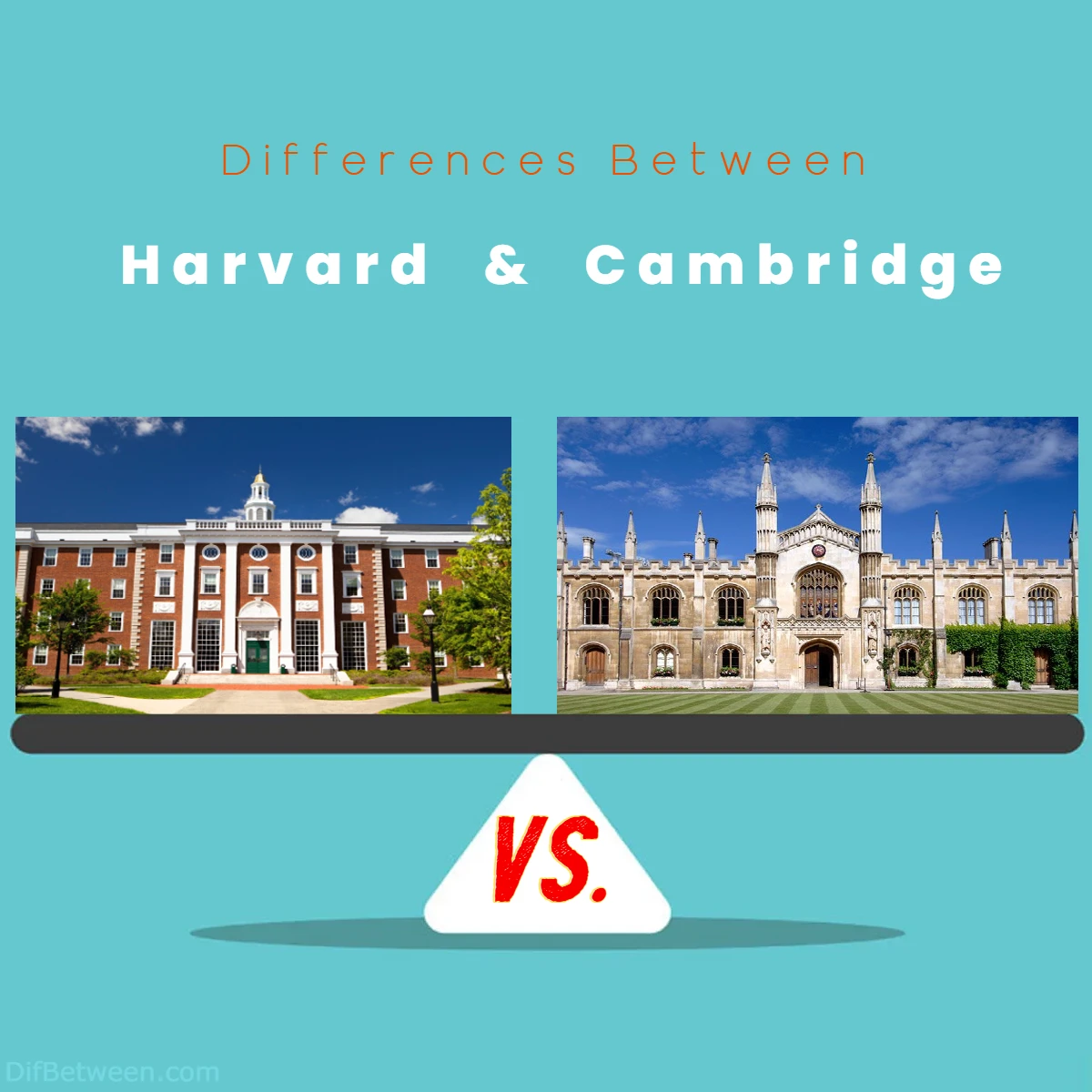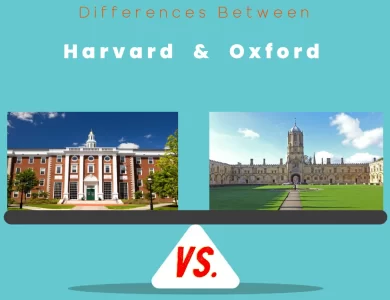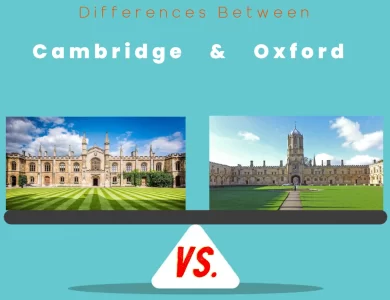
| Aspect | Harvard University | University of Cambridge |
|---|---|---|
| Location | Cambridge, Massachusetts, USA | Cambridge, England, UK |
| Foundation | 1636 | 1209 |
| Colleges | 12 undergraduate, numerous others | 31 autonomous colleges, 6 schools of research |
| Teaching Style | Discussion-based learning, small class sizes | Lectures, supervisions, small group tutorials |
| Campus Culture | Emphasis on exploration, diverse extracurriculars | Tradition, college-centric activities |
| Global Impact | Pioneering research across various fields | Influential in technology and entrepreneurship |
| Admissions | Highly selective, holistic assessment | Comprehensive evaluation, emphasis on interviews |
| Alumni Network | Global reach with extensive connections | Rich history with influential graduates |
| Cultural Diversity | Embraces diversity, global student body | Attracts international scholars and students |
| Academic Approach | Liberal arts education, interdisciplinary focus | Specialized education, in-depth subject mastery |
| Campus Setting | Urban environment with access to Boston | Quintessential English setting, near London |
| Extracurriculars | Broad range of student organizations | Rich tradition and various student societies |
| Research Emphasis | Wide array of research initiatives | Pioneer in science and technology advancements |
| Personalized Learning | Houses within a larger campus community | Collegiate system with personalized attention |
| Historical Legacy | Oldest institution in the US | One of the world’s oldest and influential |
| Location Exposure | Access to vibrant city life | Historic city with proximity to London |
Picture this: the venerable walls of Harvard, standing steadfast in the heart of Cambridge, Massachusetts, beckon with a promise of intellectual curiosity nurtured in the cradle of American education. Contrast this with the timeless charm of Cambridge, England, where the cobblestone streets whisper secrets from centuries past, and the University of Cambridge’s hallowed halls echo with the footsteps of luminaries who have forever altered the course of human knowledge. As we journey deeper, the paths diverge, revealing Harvard’s devotion to a liberal arts ethos that encourages exploration across disciplines, while Cambridge’s collegiate system nurtures specialization and fosters an intimate learning community.
Differences Between Harvard and Cambridge
The main differences between Harvard and Cambridge universities lie in their historical legacies, academic structures, teaching methodologies, campus cultures, and global impacts. Harvard, founded in 1636 in Cambridge, Massachusetts, is renowned for its liberal arts approach, encouraging broad exploration before declaring a major. In contrast, the University of Cambridge, established in 1209 in England, boasts a specialized college system that emphasizes in-depth study from the beginning. Harvard employs discussion-based learning in small classes, while Cambridge relies on lectures and supervisions. Campus culture varies with Harvard’s urban vibrancy and diverse extracurriculars, while Cambridge exudes tradition and a strong sense of community through its collegiate system. Both universities make substantial global impacts through research and innovation, shaping diverse fields. Explore the comprehensive guide to uncover these distinctions and decide which path aligns with your academic aspirations.
1. Historical Legacy and Foundation
Harvard: A Legacy of Early American Education
Nestled in the heart of the United States in Cambridge, Massachusetts, Harvard University holds the distinction of being the oldest institution of higher learning in the country. Established in 1636, it carries a rich historical legacy that spans over four centuries. Harvard’s founding fathers envisioned an institution that would cultivate new generations of clergy and leaders, reflecting the religious values of its time. Over the years, the university has evolved into a diverse and multidisciplinary hub of learning, embracing a wide array of academic disciplines.
Cambridge: Centuries of Scholarly Traditions
On the other side of the Atlantic Ocean, the University of Cambridge, located in Cambridge, England, boasts an even older lineage. Dating back to 1209, it stands as one of the world’s oldest universities. Its historical roots are deeply intertwined with the intellectual and cultural advancements of the United Kingdom and Europe. Cambridge’s foundation predated the Renaissance and Reformation periods, contributing significantly to the evolution of modern education and thought.
2. Academic Structure and Flexibility
Harvard: The Liberal Arts Approach
Harvard’s academic structure is renowned for its emphasis on a liberal arts education. Undergraduates are encouraged to explore a broad spectrum of disciplines before declaring a specific major. This approach cultivates well-rounded individuals equipped with critical thinking skills and a holistic understanding of the world. Harvard College, the undergraduate arm of the university, follows a house system that fosters tight-knit communities within the larger campus.
| Aspect | Harvard | Cambridge |
|---|---|---|
| Location | Cambridge, Massachusetts, USA | Cambridge, England, UK |
| Foundation | 1636 | 1209 |
| Colleges | 12 undergraduate, numerous others | 31 autonomous colleges, 6 schools of research |
| Nobel Laureates | 170+ | 120+ |
Cambridge: Specialized College System
Cambridge, in contrast, features a collegiate system in which students are affiliated with a particular college from the outset. This arrangement provides a strong sense of community and a more personalized educational experience. The university consists of 31 autonomous colleges, each with its own distinctive character and traditions. This college-centric model encourages close interaction among students and faculty members, fostering a supportive and collaborative environment.
3. Teaching Style and Pedagogical Focus
Harvard: Small Class Sizes and Discussion-Based Learning
At Harvard, the emphasis is placed on small class sizes and discussion-based learning. Professors often engage students in lively debates, encouraging them to question and explore ideas deeply. This interactive teaching approach promotes critical analysis and the development of effective communication skills. The university’s commitment to research extends to its teaching methods, ensuring that students learn from the forefront of their chosen fields.
Cambridge: Lectures and Supervisions
Cambridge’s teaching methodology leans towards a combination of lectures and supervisions (small group tutorials). Lectures provide students with a solid foundation in their subjects, while supervisions offer a more intimate setting for in-depth discussions and personalized guidance. This system allows students to delve into complex topics, challenge their own assumptions, and receive constructive feedback from experts in the field.
4. Campus Culture and Extracurriculars
Harvard: Liberal Arts Exploration
Harvard’s campus culture mirrors its liberal arts philosophy. Students are encouraged to explore a multitude of interests beyond their chosen major, leading to a vibrant extracurricular scene. The university boasts a vast array of student organizations, ranging from cultural clubs to academic societies. This diversity fosters a culture of open-mindedness and collaboration, where individuals from various backgrounds come together to learn and grow.
Cambridge: Tradition and Society
Cambridge’s campus culture is steeped in tradition and rich history. The university’s colleges play a central role in shaping students’ social and academic lives. Formal hall dinners, May Ball celebrations, and various societies contribute to a strong sense of community and camaraderie. The academic calendar is punctuated by traditional events, such as the Matriculation ceremony and the May Bumps rowing races, which connect students to centuries-old customs.
5. Global Impact and Research
Harvard: Pioneering Research Powerhouse
Harvard’s global influence is undeniably linked to its pioneering research endeavors. The university consistently ranks among the top institutions for research output and impact. From scientific breakthroughs to social advancements, Harvard’s scholars have shaped a wide range of fields. The institution’s extensive resources and collaborative atmosphere facilitate ambitious research projects that address pressing global challenges.
Cambridge: The Cambridge Phenomenon
Cambridge’s impact on the global stage is often referred to as the “Cambridge Phenomenon.” The university has played a pivotal role in the development of technology clusters, with its researchers and graduates founding numerous successful tech companies in the region, famously known as the “Silicon Fen.” This innovation ecosystem has positioned Cambridge as a driving force in technology and entrepreneurship.
6. Location and Surroundings
Harvard: Urban Enclave
Harvard University’s campus is situated in the lively city of Cambridge, Massachusetts, part of the greater Boston metropolitan area. This urban location provides students with access to a rich cultural scene, diverse neighborhoods, and a multitude of job and internship opportunities. The proximity to numerous tech firms, healthcare centers, and financial institutions contributes to a dynamic environment where academia intersects with industry.
Cambridge: Quintessential English Setting
In contrast, the University of Cambridge is nestled in the picturesque city of Cambridge, England. The charming cobblestone streets, historic architecture, and serene riverbanks create an idyllic backdrop for academic pursuits. The city’s proximity to London adds an extra layer of convenience, offering students a taste of both tranquil academia and the bustling capital’s offerings.
7. Admissions Process and Selectivity
Harvard: Highly Selective Admissions
Harvard’s admissions process is renowned for its selectivity. The university receives a substantial number of applications each year, making the acceptance rate quite low. The holistic approach to admissions considers academic achievements, extracurricular involvement, essays, and recommendation letters. This rigorous selection process assembles a diverse and accomplished student body.
Cambridge: Comprehensive Assessment
Similarly, the University of Cambridge employs a thorough admissions process. Prospective students are assessed based on academic qualifications, standardized test scores, and interviews (for certain courses). The interview component holds particular significance, allowing applicants to showcase their intellectual curiosity and potential. Cambridge’s approach seeks to identify candidates who are not only academically strong but also well-suited to the collegiate environment.
8. Alumni and Networks
Harvard: Global Network
Harvard’s alumni network is a testament to the university’s impact on a global scale. Graduates of Harvard are found in leadership positions across various industries, including business, government, academia, and entertainment. The extensive network fosters opportunities for mentorship, collaboration, and professional growth.
Cambridge: Influential Alumni
Similarly, the University of Cambridge boasts a roster of influential alumni who have made significant contributions to their respective fields. From Sir Isaac Newton to Stephen Hawking, Cambridge’s legacy includes pioneers in mathematics, physics, literature, and more. This network of accomplished individuals provides a solid foundation for current students and graduates seeking to make their mark.
9. Cultural and International Diversity
Harvard: A Melting Pot of Cultures
Harvard’s commitment to diversity is reflected in its student body, which comprises individuals from around the world. The university’s emphasis on inclusivity and global perspectives enriches the academic experience, exposing students to a myriad of cultures, viewpoints, and traditions.
Cambridge: Welcoming International Scholars
The University of Cambridge also draws students from various corners of the globe, contributing to a multicultural academic environment. The university’s international reputation attracts scholars seeking world-class education and research opportunities, fostering cross-cultural interactions and global collaborations.
10. Impact on Various Disciplines
Harvard: Interdisciplinary Excellence
Harvard’s reputation for interdisciplinary studies is exemplified by its diverse array of schools, including Harvard Business School, Harvard Law School, and the Harvard Medical School. This cross-disciplinary approach encourages collaboration between different fields, fostering innovative solutions to complex challenges.
Cambridge: Trailblazing Research
Cambridge’s impact on disciplines like science, technology, and mathematics is profound. Notably, the discovery of the structure of DNA, credited to Cambridge researchers James Watson and Francis Crick, revolutionized the field of biology. This legacy of pioneering research extends across various departments, inspiring students to push the boundaries of knowledge.
Harvard or Cambridge: Which One is Right for You?
Choosing between two esteemed institutions like Harvard and Cambridge is a decision that deserves careful consideration. Both universities offer exceptional academic environments and unique experiences. To help you make an informed choice, let’s dive deeper into the factors that might influence your decision.
Academic Approach and Interests
Harvard: If you’re drawn to a liberal arts education that encourages exploration across a wide range of subjects, Harvard might be the right fit. Harvard’s flexible curriculum allows you to discover your passions while developing critical thinking skills that can be applied to various fields. If you thrive in discussion-based learning environments and value interdisciplinary collaboration, Harvard’s approach could align with your academic goals.
Cambridge: If you prefer a more specialized focus from the start and appreciate a personalized learning experience, Cambridge could be your choice. Cambridge’s collegiate system provides a close-knit community where you’ll dive deep into your chosen field of study. If you’re enthusiastic about research and seek a strong foundation in your chosen discipline, Cambridge’s emphasis on lectures and supervisions might resonate with you.
Campus Culture and Lifestyle
Harvard: If you’re excited about an urban campus with access to a vibrant city life, Harvard might be your preference. The bustling atmosphere of Cambridge, Massachusetts, offers cultural experiences, networking opportunities, and a dynamic environment that complements your academic journey. Harvard’s diverse extracurricular offerings can also enrich your overall college experience.
Cambridge: If you’re enchanted by the idea of a quintessential English setting and value traditions, Cambridge could be your choice. The historic charm of Cambridge, England, provides a serene backdrop for your studies. If you’re looking to immerse yourself in centuries-old customs, enjoy formal hall dinners, and engage in a strong sense of community within a college, Cambridge might be the right fit.
Global Impact and Research
Harvard: If you’re passionate about groundbreaking research and want to be part of an institution that leads in various fields, Harvard could be your destination. Harvard’s emphasis on innovation and its extensive resources offer opportunities to contribute to significant advancements in academia and beyond.
Cambridge: If you’re intrigued by the prospect of joining the “Cambridge Phenomenon” and making an impact in technology and entrepreneurship, Cambridge might be the right choice. The university’s legacy of innovation and its role in fostering tech clusters could align with your aspirations.
Location and Cultural Exposure
Harvard: If you’re interested in experiencing American culture and having easy access to a major global city like Boston, Harvard might be a great match. The city’s diversity and industry connections can provide valuable insights into various sectors.
Cambridge: If you’re excited about immersing yourself in the rich history and cultural offerings of an English city, Cambridge could be the place for you. The city’s proximity to London also offers opportunities to explore a bustling metropolis and its diverse offerings.
Admissions and Personal Fit
Harvard: If you’re ready for a highly competitive admissions process and value a diverse, inclusive, and academically rigorous environment, Harvard could be your choice. Prepare to showcase your achievements, extracurricular involvement, and unique perspectives.
Cambridge: If you’re open to a comprehensive assessment that includes interviews and value a close-knit, intellectually stimulating community, Cambridge might be a great fit. Be prepared to demonstrate your academic aptitude and potential during the admissions process.
Conclusion: Follow Your Heart and Ambitions
Ultimately, the decision between Harvard and Cambridge should align with your personal aspirations, learning style, and desired experiences. Both universities offer exceptional educational journeys that can shape your future. Take the time to reflect on what matters most to you academically, culturally, and personally. Whether you choose the historical legacy of Cambridge or the liberal arts tradition of Harvard, your time at either institution will be an unparalleled adventure of learning, growth, and exploration.
FAQs
Harvard and Cambridge differ in their foundation dates, locations (Cambridge, Massachusetts vs. Cambridge, England), academic structures, teaching methods (liberal arts at Harvard vs. specialized colleges at Cambridge), campus cultures, and global impacts.
Harvard’s liberal arts education encourages students to explore various disciplines before choosing a major, fostering well-roundedness. In contrast, Cambridge’s specialized college system offers a more focused education from the start, allowing students to delve deeply into their chosen subjects.
Harvard utilizes discussion-based learning and small class sizes, fostering critical thinking and communication skills. Cambridge emphasizes lectures and supervisions, providing a solid foundation followed by in-depth discussions for a comprehensive understanding.
Harvard boasts an urban campus in Cambridge, Massachusetts, with diverse extracurriculars, encouraging exploration. Cambridge’s campuses in England offer a quintessential English setting and a strong sense of community through its collegiate system and rich traditions.
Harvard pioneers research across various fields, making significant contributions to academia and addressing global challenges. Cambridge’s “Cambridge Phenomenon” extends its impact to technology and entrepreneurship, fostering innovation in the region.
Harvard and Cambridge have competitive admissions processes. Harvard’s holistic approach considers academics, extracurriculars, essays, and recommendations. Cambridge assesses academic qualifications, standardized test scores, and conducts interviews for certain courses.
Harvard’s extensive global network connects graduates across industries, fostering mentorship and collaboration. Cambridge’s alumni include influential figures who have left an indelible mark on various fields, contributing to its rich history.
Both Harvard and Cambridge offer diverse student bodies, but Harvard’s emphasis on inclusivity and global perspectives might appeal to those seeking a multicultural environment.
Harvard’s wide range of schools facilitates interdisciplinary research, while Cambridge’s legacy of groundbreaking research, like the discovery of DNA’s structure, highlights its impact on science and technology.
Consider your academic interests, preferred teaching styles, campus environment, and future aspirations. Delve into our detailed exploration of the differences between Harvard and Cambridge to make an informed decision that aligns with your goals.
Read More:
Contents
- Differences Between Harvard and Cambridge
- 1. Historical Legacy and Foundation
- 2. Academic Structure and Flexibility
- 3. Teaching Style and Pedagogical Focus
- 4. Campus Culture and Extracurriculars
- 5. Global Impact and Research
- 6. Location and Surroundings
- 7. Admissions Process and Selectivity
- 8. Alumni and Networks
- 9. Cultural and International Diversity
- 10. Impact on Various Disciplines
- Harvard or Cambridge: Which One is Right for You?
- Conclusion: Follow Your Heart and Ambitions
- FAQs






